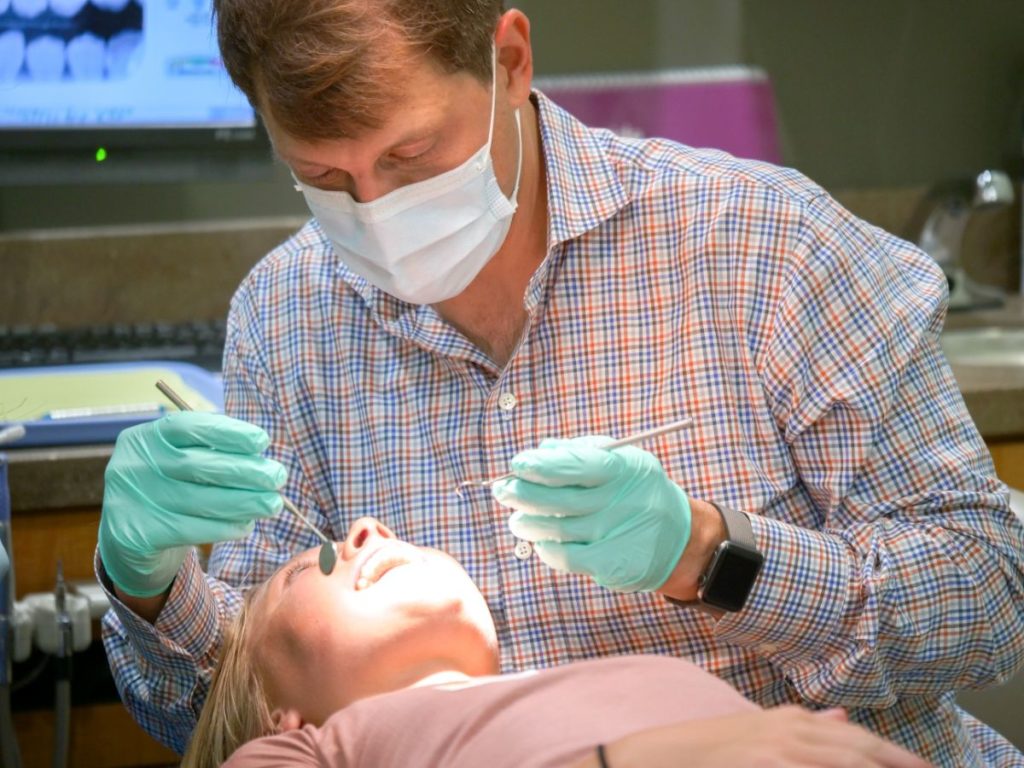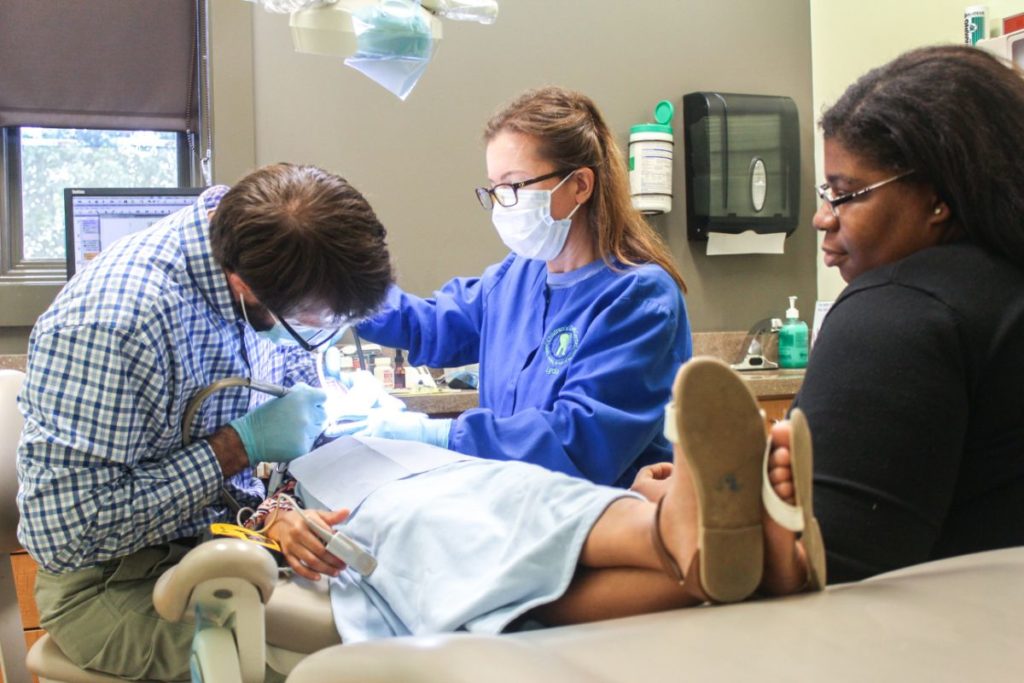Tooth enamel is the first line of defense your teeth have against plaque and cavities, but it can still be eroded despite how strong it is. This can leave a child’s teeth susceptible to tooth decay, cavities, and even gum disease.
Here at Children’s Dental Center, we are committed to providing excellent pediatric dental care to kids across Memphis and the Mid-South. Because we offer both preventive and restorative services, we know firsthand the ways that acid erosion can affect a child’s mouth. However, there are many simple steps you can take as a parent to protect your child’s smile and keep their tooth enamel healthy. Let’s take a closer look at what tooth enamel actually is, what causes acid erosion, and what you can do to prevent it!
What is tooth enamel?
The enamel on our teeth is the most visible part, covering the outer layer of each tooth. It’s made up of mostly minerals, and is the hardest substance in the body. Enamel forms a strong barrier that helps protect the inner layers of the teeth from the effects of acids and plaque, and from foods and beverages that are very hot or very cold.
Acid erosion thins enamel, making it more susceptible to decay and sensitivity. Over time, this erosion can become so severe that visible spots of wear may appear on a child’s teeth. These spots occur where the enamel has completely eroded, exposing the sensitive dentin layer beneath.
Tooth enamel does not grow back. Fluoride can help strengthen it, but your body will not make more to replace what has been lost. Unlike other parts of your body – your bones, for instance – enamel does not contain any living cells, so it cannot regenerate.This is why it’s so important to try and prevent acid from eroding your child’s teeth in the first place!
What can cause acid erosion of the enamel?
There are some natural causes of acid erosion, such as acid reflux and tooth grinding. It can also be caused by certain medications and medical conditions. However, most of the damage tends to be done by the foods and drinks our children consume. Soft drinks are a frequent contributor of erosive acids, due to their high levels of phosphoric and citric acids. Fruit juices, sports drinks, and energy drinks are other culprits. Additional common causes of acid erosion include:
- Dry mouth or low salivary flow, also known as xerostomia
- A diet that is high in sugars and starches
- Gastrointestinal problems
- Environmental factors such as friction, wear and tear, stress, and corrosion
Keep in mind that even “sugar free” drinks or flavor drops still contain acids that can erode your child’s teeth enamel, so be mindful about consumption.
Signs of acid erosion
When enamel erodes, it leaves the tooth more susceptible to decay. If there are small cavities as a result, they may not cause any noticeable effects initially. But if the decay is left to extend and penetrate the tooth, it can affect the nerves, potentially causing painful abscesses or infection.
While you may not be able to see any initial signs of acid erosion in your child’s smile, experienced dentists like ours will be able to observe and assess them during regular check-ups. Some of the signs and symptoms they’ll be looking for include:
- Rounded edges – The edges of the teeth are exposed to the most acid wear, so they will tend to the first signs of erosion.
- Dull or discolored teeth – As enamel begins to wear away, the teeth can lose their shine, giving them a dull or discolored appearance.
- Yellowing – If a significant amount of enamel has been worn away from the tooth, the dentin layer underneath can become more visible, yellowing the surface slightly.
- Translucence – As the enamel continues to wear away, teeth can become noticeably thinner, giving the edges of the teeth a translucent quality.
- Sensitivity – In the later stages of enamel erosion, the underlying layer of dentin can become exposed, causing painful sensitivity.
- Cracks and chips – Throughout the process of erosion, the edges of the teeth can become rougher, more irregular, or jagged.
How to prevent acid erosion
Maintaining a good dental hygiene routine is one of the best and easiest ways to prevent acid erosion from damaging your child’s tooth enamel. We encourage all of our patients to brush twice per day, for two minutes each time, and floss every night before bed. If your child is on the younger side, you should help them with their brushing and flossing to ensure they’re doing it correctly. Scheduling a routine check-up every six months or so with our office is also an essential part of preventive dental care. Other helpful ways to discourage acid erosion in your child’s teeth are listed below.
Drink plenty of water
Water is without question the best thing for your child to be drinking. It’s not at all acidic, so it won’t harm tooth enamel. It also improves saliva production, which helps to clean the teeth of debris and keeps a healthy ph balance in the mouth.
Rinse with water after meals and snacks
Food debris that sits on the teeth for an extended period of time attracts bacteria and can increase the risk of cavities and erosion. After each meal, have your child swish clean water around in their mouth for about 30 seconds before spitting it out.
Avoid foods and drinks that are high in sugar
Sugar provides a banquet for the bacteria in your child’s teeth, once again increasing the risk of cavities, decay, and erosion. Try to steer clear of prepackaged snacks that are high in sugar, as well as sodas, fruit juices, and sports drinks.
Put limits on items with citric acid
Food and drinks that are high in citric acid erode the tooth enamel in a process we call demineralization. Advanced cases can lead to tooth sensitivity and pain. Citric acid is found in many fruits and vegetables, most notably lemons, limes, and oranges, but pineapples, tomatoes, and some berries also contain various amounts of the acid. A manufactured form of citric acid is commonly used as an additive in food and nutritional supplements, so make it a habit to check packaging before buying certain drinks and snacks.
Let the experts at Children’s Dental Center help protect your child’s smile
As we’ve mentioned, once the enamel of a tooth is lost, the body cannot replace it naturally. That said, there are some ways we can treat teeth that have suffered enamel loss due to acid erosion. Using a strict remineralisation regime, tooth enamel loss may be limited with no further treatment required. Sensitive toothpaste can often be used to help manage any pain and discomfort. For more advanced cases, we may recommend a filling to protect the tooth and improve its cosmetic appearance. If enamel loss is significant, it may be necessary to cover the affected tooth or teeth with a crown to protect from further decay.
At Children’s Dental Center, we have an expert team in place to evaluate your child’s overall oral health. Check and documenting the state of your child’s tooth enamel is part of our regular check-ups, which is one reason these visits are so important! If your child is due for an appointment with us, or you’d like more information on preventing acid erosion for a healthy smile, get in touch today and we’ll be happy to take care of that for you.
 Request an Appointment
Request an Appointment

